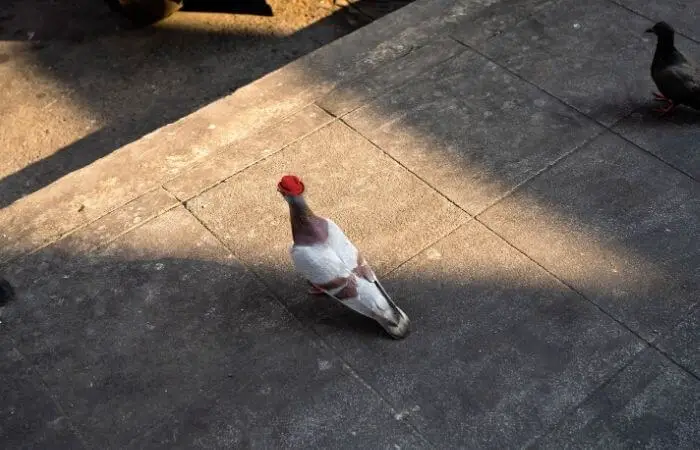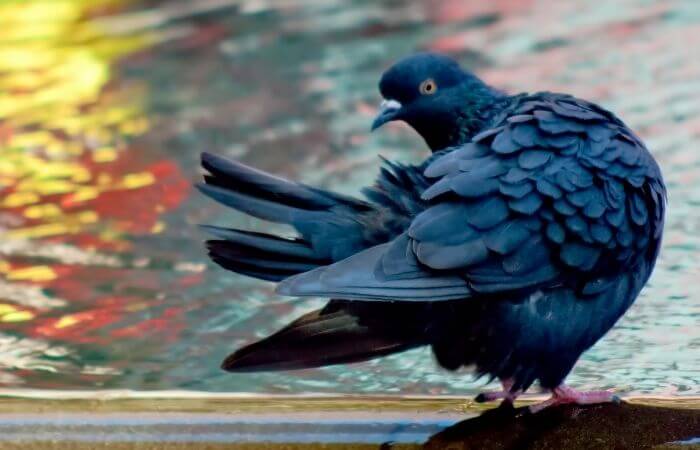Pigeons are very intelligent birds and it has been scientifically proven that they can learn.
They are in the top six of all animals when it comes to intelligence.
They have passed the ‘mirror’ test which means that they have the ability to recognize themselves when they see their reflection.

It is well known that pigeons are used for racing, because they have a well-developed homing instinct, but it isn’t only instinct that makes a good homer.
They have to be trained to return to their lofts over distances. This training starts when they are newly hatched.
It’s called imprinting.
Pigeons react positively to human interaction.
Their owner must handle the chicks every day and after about six weeks encourage them to leave the loft.
They must be fed on a regular schedule and command signal or sound used when feeding.
Then they are taken short distances away from their loft and released.
The gradual lengthening of distances will hone their homing instincts.
So, what else can they do?
Training or Tricks?
Because of their noted intelligence, pigeons have featured in experiments in the fields of comparative psychology and animal cognition.
They have been trained to press levers or peck at buttons to receive a food treat.

Once they had learned the basics of the exercise, the controls releasing their rewards were changed.
Some had their positions changed and others were hidden, but in nine out of ten cases, the pigeon found the correct release button without being prompted.
Pigeons Can Be Trained In Tumor Detection
Pigeons have amazing visual skills.
This is in part because of their fantastic navigational abilities.
It is said that homing pigeons can easily memorize landscapes while flying.
In one of the famous experiments using pigeons, they could accurately distinguish between the works of two of the world’s most famous impressionist painters.
Taking this idea, researchers wondered if the pigeons’ abilities extended to X-rays.
They concentrated on cancer detection, which is done by the human eye and magnifiers.
The initial purpose is to identify if cancerous growth is either malignant or benign.
The pigeons had an 85% success rate.
Pigeons haven’t been used as frontline diagnosticians as yet, despite their success, but who knows what the future holds?
How to Train Your Pigeon?
Any kind of animal training takes bags of patience and time.
Training should be done with kindness, not cruelty.
Rewarding them with treats is the best way to get their attention and imprint what you want them to do on their minds.
Pigeons are quick learners and can distinguish between voice commands or the use of clicker devices.
Pigeons are also very observant: they use their visual abilities every second they are awake.
Pigeons Can Learn To Dance
Pigeons are said to like music so training them to dance is by no means impossible.
If you want them to dance, it’s best to use music with a good beat or rhythm.
It is said that they use or can feel the earth’s magnetic fields when flying, which are invisible energy pulses.
You can imagine that sound waves act on pigeons the same way.

Of course, it wouldn’t work on some feral pigeon that you’ve picked out in some inner city square.
The pigeon will have to have a close relationship with you. A relationship of trust and friendship, like a pet.
Putting on some music and shouting ‘Dance’ isn’t going to work.
The thing about pigeons is that they are intelligent enough to follow instructions, but they have to be shown first.
Dancing to the beat of the music in front of your pigeon, plus command signals and rewards will give them the idea.
That and a lot of patience.
What Other Tricks Could A Pigeon Learn?
As pigeons have the ability to distinguish between different objects, you could train your pigeon to make choices on command.
Maybe choose your clothes or fashion accessories?
Maybe train your pigeon to come or go on command?
Parrots can be trained to talk or at least imitate sounds, but pigeons don’t have that kind of vocal ability, so that’s out.
Other birds can be trained to wave by lifting a wing. With the intelligence of pigeons, that shouldn’t be so difficult.
If your mind has a criminal bent, you could train your pigeon to be a pickpocket.
Other birds such as magpies are famous for nicking things, without any prompting.
Surely, a pigeon could be trained to pick a pocket or two?
